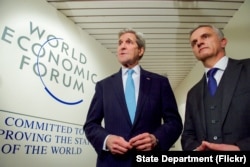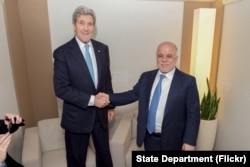Efforts to launch a political transition in Syria, the plight of Americans missing in Iraq and the fight against Islamic State militants are among the issues that Secretary of State Kerry discussed Thursday in a series of meetings and interviews in Switzerland.
His talks took place on the sidelines of the World Economic Forum in Davos, an annual gathering that brings together high-level government officials and corporate executives.
“This has a one stop shopping capacity that you only get otherwise I think at the U.N.,” said Kerry, in reference to the opportunities to meet with his counterparts and other officials during the forum.
Syria talks
U.N. Syria envoy Staffan de Mistura was among the officials that Kerry met with on Thursday.
Later, Kerry said there would be no "fundamental delay" in the U.N.-mediated talks on a political transition in Syria.
The U.N. set a January 25 start date for the start of proximity talks between the Syrian government and opposition. The two sides sit in different rooms in proximity talks.
Kerry said there may be a delay of a "day or two" for invitations to the talks. Later, he noted that de Mistura had the ability to “issue whatever kinds of invitations he desires,” indicating that the make-up of the Syrian opposition side may change. There has been debate over which opposition groups would be represented at the talks.
Earlier, de Mistura said even if there are disputes over who will attend the U.N.-mediated talks, the peace process must go forward. "We need to maintain pressure" on all sides, he told CNN television, "We need to maintain momentum."
Americans missing in Iraq
Kerry also met with Iraqi Prime Minister Haider al-Abadi.
Asked about three Americans who disappeared in Iraq last week, Abadi said he doubts they were abducted by an Iranian-backed Shi'ite militia, as some reports have indicated.
"We don't know if they have been kidnapped," Abadi said. "They just went missing."
Kerry later said he raised the issue during his talks with the prime minister, who had no information on the Americans’ status.
US – Iran relations
The secretary’s high-level meetings in Davos have come less than a week after world powers implemented the Iran nuclear agreement, and the U.S. imposed new sanctions on Iran for ballistic missile tests.
Iranian Foreign Minister Mohammad Javad Zarif responded to the new penalties, saying it indicated the U.S. was “addicted” to using sanctions as a tool for diplomacy.
"We have made it very clear that we will use sanctions when we think they are appropriate," said Kerry.
The U.S. sanctions were imposed "judiciously and effectively," Kerry said, and the United States is looking now to "put to the test" Iran's willingness to reduce regional tensions.
Later, Kerry said he had met briefly with Zarif in Davos.
The U.S. Treasury Department estimates the lifting of nuclear-related sanctions has resulted in Iran having access to about $55 billion in previously frozen assets.
In an interview with CNBC, Kerry was asked if he believed some of that money could wind up in the hands of terrorists.
He said he thought some of the funds could end up in the hands of the controversial Iranian Revolutionary Guard, but added, there were no early indications of funds “going to that kind of endeavor.”
Kerry also met with Israeli Prime Minister Benjamin Netanyahu, who strongly opposed the major world powers' nuclear agreement with Iran.
Fighting Islamic State
The talks in Davos are taking place ahead of Kerry’s February 2 meeting in Rome, with about two dozen foreign ministers from countries part of the anti-Islamic State coalition in Iraq and Syria.
“We are going to prevent them [Islamic State] from being the threat in Syria and Iraq that they are today by the end of the year, said Kerry, in a roundtable with reporters.
Kerry will address the World Economic Forum on Friday before heading to Saudi Arabia, the next leg of a five-nation tour that also includes stops in Asia.
In a Wednesday speech, Vice President Joe Biden urged executives to support initiatives that would strengthen the middle class saying, "Embrace the obligation to your workers as well as to your shareholders."







